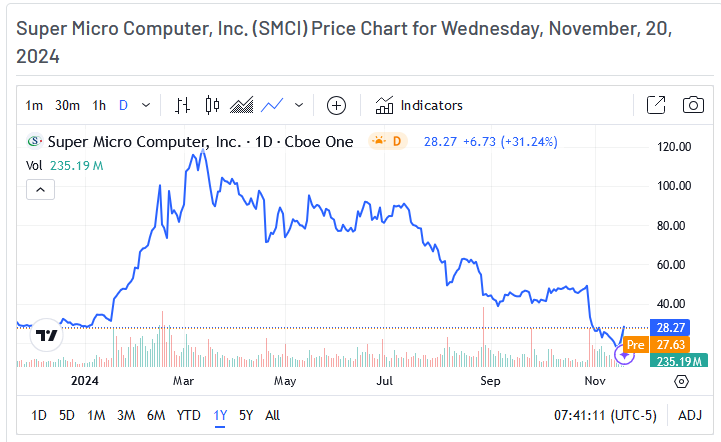- As the Super Micro Computer accounting debacle matures into a disaster, investors wonder whether it will affect NVIDIA stock next.
- Investors can examine the company's financials and find discrepancies that could cause the stock to sell off soon.
- NVIDIA's financials show a more stable path and character, so investors could consider buying the dip even if it sells off.
One of the biggest debacles in the stock market is whether the technology sector will make it out alright after this quarter. Particularly, the semiconductor industry has grown to represent a larger share of the overall economy and stock market, so it makes names like Super Micro Computer (NASDAQ:SMCI) and its main supplier, NVIDIA (NASDAQ:NVDA), carry more pressure today than ever before.
As if that wasn’t enough, the two are under the spotlight for all the wrong reasons. There are rumors that the entire industry is playing a game of hot potato by rerouting orders and marking inventory suspiciously at best. However, markets still seem faithful to the possibility that these accusations won’t be here for longer or won’t materialize enough to send the stock down.
Investors can see this conclusion by how Super Micro Computer has rallied by over 28% in a single day, the day after it met its deadline with the NASDAQ exchange to avoid de-listing, after submitting its new compliance program and hiring a new auditor, it looks like the company may be in the clear for now, but is it out of the woods yet? There is no clear answer, but there are better ways to ask the question, and these may also spill over to affect NVIDIA stock this week.
Accounting Challenges Pose Significant Risks for Super Micro Computer Stock in Upcoming Quarters
The top and bottom lines for Super Micro Computer stock look great. Revenues reached up to $5.3 billion in the latest quarterly earnings results, a jump of 143% from the same quarter last year. With this growth, investors could explore the financials to find more growth.
Net income was $352 million, up from $193.6 million a year ago. However, here’s where the image starts to shift away from reasons to celebrate and into reasons to worry.
The number of outstanding shares increased by 8 million during the 12-month period, which should raise red flags for investors everywhere.
If the business generated up to $352 million in net income, why would management have to issue more stock and raise money for operations? This discrepancy usually leads investors down a rabbit hole to the conclusion of suspicious activity and overstating earnings.
Without going into the rabbit hole, the cash flow statement can act as another great gauge and time saver to find all the answers investors seek. The operating cash flow figures will settle all doubts. Super Micro Computer reported a net outflow of $2.5 billion for the quarter.
Two things seem to be wrong with the business. There was positive net income, but there was still a need to raise cash by issuing stock. Then, the cash flow statement shows a net outflow (loss) significantly different from the reported net income, so the business burned $2.5 billion, hence the need to raise capital.
More than that, the company’s accountancy team from Ernst & Young resigned ahead of the due date for quarterly earnings filings, which should raise another red flag for investors. Super Micro Computer has replaced its accountancy team with those from BDO USA as its new independent auditor.
The problem is that regulators have already flagged and fined BDO for breaking rules in the past. So, by connecting the dots, investors can see the issues boiling in Super Micro Computer stock. They overstated their earnings, forced their accountants to leave, and now hired an independent auditor with a criminal past.
How Super Micro Computer's Issues Could Impact NVIDIA Stock Performance
Now, the other issue becomes whether NVIDIA will be affected, considering that Super Micro Computer represents up to 9% of NVIDIA’s revenue. The connection is very clear: if Super Micro Computer overstated its inventory and sales, then NVIDIA most likely also overstated its own numbers.
Checking in for the same discrepancies as in Super Micro Computer, NVIDIA does have a better profile, making it a somewhat safer subject in this debacle. According to NVIDIA’s latest quarterly figures, investors can deduce the following:
NVIDIA generated up to $16.6 billion in net income and, at the same time, actually bought back stock to retire up to 200,000 shares off the open market. That makes more sense, as the story looks like the business made money this quarter, unlike Super Micro Computer.
Looking into the cash flow statement, NVIDIA’s operating cash flows show a net inflow of $14.5 billion, which reiterates the profit shown in the income statement. Due to the timing of inventory and sales, a healthy margin of $2 billion exists between the two.
That’s an entirely different picture and story than Super Micro Computer’s today, and hence why there could be a dip in NVIDIA stock when and if Super Micro gets into trouble, but now investors know that this is a dip that could be bought.
